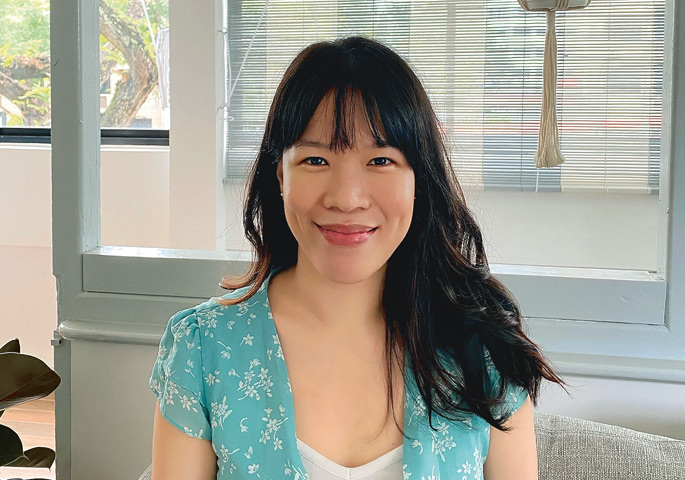Come In, Let’s Talk
July 25, 2024
IN BRIEF | 10 min read
- Even as she helps the community improve their mental health, Dr Charmaine Lim (NUS Psychology ’12) is also mindful about safeguarding hers.
“I would go home and just cry,” recalled clinical psychologist Dr Charmaine Lim. “It was so heartbreaking to hear about the abuse and trauma that my clients at Boys’ Town had faced, despite being so young.” Those early experiences strengthened her resolve to make mental healthcare more accessible, especially to vulnerable communities. That is precisely what she has done with Talking Therapy, the mental health clinic she started with the aim of democratising mental health care. Dr Lim specialises in care for individuals, offering various forms of therapy. She also prides herself on being an LGBTQ-friendly counsellor.
“I got into psychology to help people, so these services are a way of making an impact,” she said, explaining her decision to start Talking Therapy. But there are days when the 35-year-old needs to trade the psychologist’s chair for the client’s one. “Most days, I can get by with a cuddle from my dog Pumpkin or spending time with my family and friends, but there are days when I do benefit from the perspective of a psychologist,” she said. “Helping myself helps me help others better too.”
“A common misconception is that you have to have poor mental health to see a psychologist,” she continued. But that’s not always the case: for some, the process of psychotherapy — simply talking to a psychologist — can be a useful and routine way of understanding and managing your emotions. It is a misconception she tries to correct with the patients she sees. “Some of my clients are guilty about coming for therapy, because they feel that there are others who are worse off who would benefit from a session,” Dr Lim shared. “But I remind them that you can drown in one inch of water.” 2

Singapore's Evolving Attitude Towards Mental Health
Singaporeans are becoming more aware of this, as evidenced by the findings of the 2022 National Population Health Survey. The survey found that although mental health had worsened, more are willing to seek help. “It’s a welcome trend — because just a few years ago, people were afraid to speak about mental health at the workplace, for fear of ridicule, or worse, losing their job,” Dr Lim observed.
Over her 11 years in the mental health space, Dr Lim has seen it evolve dramatically for the better. “There’s a lot more awareness, especially among important stakeholders like corporates.” She has been part of that change, serving as a wellbeing specialist partner for NUS staff during the COVID-19 pandemic. In this role, she supported lecturers, university administrators and researchers. “Having that avenue for employees to come forward and share their struggles in a safe space is so important,” she explained. “We’ve seen how it improves team morale and overall satisfaction across the organisation.” In 2023, she then served as Associate Director and Lead Clinical Psychologist in the University Counselling Services for students.
PSYCHOTHERAPY 101
WHAT IS PSYCHOTHERAPY?
Psychotherapy, also known as talk therapy, provides support for individuals dealing with mental health, emotional or interpersonal challenges.
ENHANCE SELF-UNDERSTANDING
From managing persistent feelings of sadness and anxiety to addressing relationship issues and enhancing self-esteem, therapy offers a safe and supportive space for exploration and healing.
NOT JUST FOR SEVERE CHALLENGE
It is important to note that psychotherapy isn’t solely for those experiencing severe challenges; anyone seeking self-understanding, behaviour pattern exploration or healthier coping strategies can benefit.

Finding Her Calling
Given her affable demeanour, Dr Lim’s chosen career seems like an obvious fit. But this wasn’t always the case. “Before NUS, I completed a diploma in hospitality and tourism,” she explained, adding that she was part of the teams that put together massive events like the Youth Olympic Games and the annual F1 Singapore Grand Prix. “I even took a leave of absence during my time at NUS to work on F1.” But she decided to give a career in psychology a shot after graduating from NUS. “I was excited by the chance to connect with others,” she recalled, adding that volunteering stints with the Institute of Mental Health and migrant workers’ welfare groups only cemented her decision.
Her first full-time stint as a counsellor at Boys’ Town was an eye-opener. “It was there that I really began to contextualise the theories I had learnt in school,” she said. “My team was great; I remember my supervisor telling me to put aside the theories for the first few sessions and just spend time to connect with the boys. That really made the difference.” After all these years, Dr Lim still gets immense satisfaction from seeing her clients improve. “There’s something deeply fulfilling about accompanying them through their struggles and triumphs, witnessing their resilience in the face of adversity, and ultimately seeing them emerge stronger and more empowered. The moments when clients recognise their progress and reflect on how far they’ve come is very rewarding.”
This story first appeared in NUSNews on 21 July 2024, as part of a series covering Commencement 2024, and celebrating the achievements of NUS graduates from the Class of 2024.

